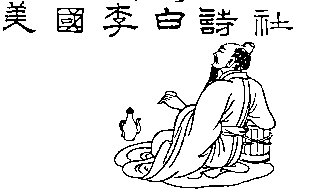Key Principles in Chinese Poetics |
|
The following are taken from Lu Chi's classic treatise, Wen Fu, Or "An Essay on Literature." Each principle is given both in a translation of the poetic original and in a more prosaic general statement:
"Erect in the Central Realm the poet views the expanse of the whole universe,
And in tomes of ancient wisdom his spirit rejoices and finds nurture" (1.1-2)
"And the mind, self-buoyant, will ever soar to new insurmountable heights.
When the search succeeds,
Feeling, at first but a glimmer, will gradually gather into full luminosity,
. . . .
Thus, the poet will have mustered what for a hundred generations awaited his brush,
To be uttered in rimes for a thousand ages unheard
. . . .
Eternity he sees in a twinkling,
And the whole world he views in one glance. (2. 4-5, 15-16, 19-20)
"When the substance of a composition, trunk of a tree, is by Truth sustained,
Style aids it to branch into leafy boughs and bear fruit.
Indeed, feeling and expression should never fail to correspond,
As each emotional change wears a new complexion on a sensitive face." (3.19-22)
"A composition comes into being as the incarnation of many living gestures,
It is (like the act of Tao) the embodiment of endless change.
To attain Meaning, it depends on a grasp of the subtle.
. . . .
Yet if a poet masters the secret of change and order,
He will channel them like directing streams to receive a fountain;
But once a false move leads to reckless floundering,
The end and the beginning are thrown into confusion.
. . . .
A composition is ruined
When a later passage swells to engulf its forerunners,
Or a downright statement encroaches on all that follows. (6.1-3, 9-12, 15-17)
"After the choice is made on the most accurate balance,
The Master Carpenter's tape it must also fit.
Lavish expressions may contain abundant truth,
But fail to direct and drive the Meaning home.
. . . .
A pithy saying at a crucial point
May whip all parts into a whole.
Though all the words are in nice order arrayed,
Such a "rallying whip" is needed to make them serve.
The utmost is achieved at slightest cost,
When the kernal, unequivocal, suffices. (6.29-32, 35-40)
"The heart then feels like a forlorn lover, doomed to desolation,
Yet haunted by a Meaning evasive, intangible, but never to be shaken off.
Let it, then, be contained like jade in rocks, that a mountain loom in radiance,
Or cast it like a pearl in water that a whole river gleam with splendour.
. . . .
In humble tunes that may mingle with the most exalted strains,
I find resources, too, for any grandeur they may augment." (6.119-122, 124-125)
"The Soul is indrawn to search the hidden labyrinth;
Within oneself is sought where inner light may be stored.
Behind a trembling veil Truth seems to shimmer, yet ever more evasive.
And thought twists and twirls like silk spun on a clogged wheel.
. . . .
While the Secret may be held within oneself,
It is none the less beyond one's power to sway." (10.19-22, 24-25)
Finally, literature offers expansive possibilities for its subject:
"The use of literature
Lies in its conveyance of every truth.
. . . .
No regions are too remote but it pervades,
No truth too subtle to be woven into its vast web.
Like mist and rain, it permeates and nourishes,
. . . .
Virtue makes it endure and radiate on brass and stone,
And resound in an eternal stream of melodies ever renewed on pipes and strings."
Let's review the basic ideas:
All of this suggests a style of poetry that relies on intuition and understatement. It prefers to leave matters mysterious and evocative, rather than explicit and spelled-out.
